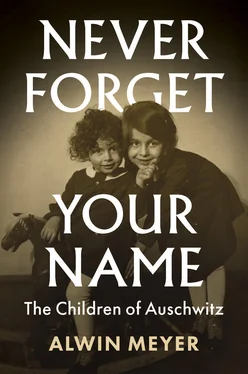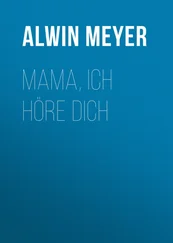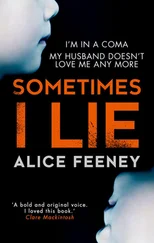All roads to Palestine were now blocked. According to a decree of 23 October 1941, Jews were no longer allowed to emigrate. 25Jürgen and his colleagues hoped at least to be able to stay in Germany.
In Berlin, Wolfgang’s sister Ursula Brigitte was recruited as a forced labourer at Batteriefabrik Pertrix in Niederschöneweide. Here, in one of the most important industrial districts of Berlin, Jewish forced labourers had been employed since 1938. They were to be joined later by prisoners of war, and forced labourers and concentration camp inmates from other countries. In autumn 1944, a satellite camp of Sachsenhausen was installed in Schöneweide, where up to 500 women whiled away their time. Since April 1944, the manufacture of aircraft batteries, vital for the war effort, had had absolute priority at Pertrix. 26
Ursula Brigitte Wermuth was arrested by the works security [ Werkschutz ] in July 1942, with four other women, for allegedly communicating with prisoners of war. Their ‘offence’: they had given them shaving brushes and toothpaste. The day after their arrest, a Wehrmacht lieutenant appeared at the door of the family’s apartment. He reproached Käthe Wermuth, saying ‘How could your daughter have anything to do with those gypsies?’
‘You know, these people in uniform have served their country just like you’, she replied. The lieutenant was taken aback at the lack of respect shown to him by a Jew. She was charged, but acquitted. In front of the courthouse, the Gestapo was waiting. ‘They arrested her on the spot but later released her again.’
‘After three or four days, we received an anonymous letter. It was three pages long and apparently came from a high-ranking member of the Gestapo, who had interrogated my sister. I can recall a few sentences from it. “We have questioned your daughter. I’m personally sorry, but that’s how the world is today. Perhaps a new dawn will come for you one day.” A few days later, the Wermuths received an official letter informing them that Ursula Brigitte was in the women’s prison in Lehrter Strasse, Moabit, and that visits were only possible by special permission. But Wolfgang’s mother simply went there with a package with linen and sandwiches. ‘At the prison gates, a guard told my mother that she had a nerve coming to the Gestapo without permission.’ By chance, Käthe saw her daughter waving from behind a barred window and was able to wave back to her. It was the last time she saw her.
After the war, Wolfgang Wermuth discovered that his sister had been deported initially to the women’s concentration camp at Ravensbrück and then to Riga in Latvia, where she was shot in the forest of Rumbala in a mass execution.
The first transport of German Jews from Berlin-Grunewald train station reached Riga on 30 November 1941. The 1,000 or more Berlin Jews were all murdered in Rumbala. 27On that Sunday, on 8 December, around 25,000 Latvian Jews from the Riga ghetto were also shot. 28
By the end of October 1942, a further seven transports with over 6,500 Jewish children, women and men left from Berlin alone. Practically none of them survived. For example, the 959 people on the transport of 19 October, including 140 children under 10 years of age, and the 55 children under the age of 10 on the transport of 26 October, were all murdered immediately in the forest near Riga. 29
At around this time, in Paderborn, the members of Jürgen Loewenstein’s group were able to write and receive letters. They were also allowed to receive packages from friends and relatives. The letters and cards sent by Jürgen Loewenstein from Paderborn to Ernst Gross, a family friend, at Chausseestrasse 125 in Berlin, have survived. After liberation, they met up again, and Jürgen was given his letters back. On 23 December 1942, he wrote the following:
I’m sure you know that my parents are gone. They were taken on the 3rd of this month. I’ve had no news since. I didn’t even receive a letter, just a notification from people I don’t know. Now I sit here and realize that I’m all alone, that I have no more relatives, that it’s Christmas tomorrow, and Chanukah has already passed, and there was no letter, no package with gifts, as was usually the case, and that I was alone and abandoned. But that doesn’t help. Head up, don’t think, just hope, hope, hope.
Here there’s no change. The work is difficult (I’m now on rubbish collection) and the food is mediocre. You probably know that we don’t get any meat, eggs or cake rations. But we have to make do. Sometimes we are really hungry.…
Tomorrow is Christmas Eve and I wish you all the best. I hope you all keep well.… Up to now I always spent Christmas at home and, I think, at your house. But that’s all finished now.
Jürgen’s parents were deported to Auschwitz on the 24th transport east from Berlin on 9 December 1942. 30The 1,060 children, women and men arrived the following day, of whom 137 men and twenty-five women were allowed to live. Jürgen’s parents, Paula and Walter Loewenstein, and a further 896 children, women and men were murdered in the gas chambers. 31Jürgen wrote to Ernst Gross in Berlin on 7 February 1943:
There are 100 of us in all.… In my room there are six boys of my age and with the same goal. They’re all great guys and we get on very well together. If one gets a package or something from the city, it’s shared with everyone.…
One friend has his birthday on 20 February. Could you not put a small package together? A little present and a nice letter. I’m sure it would give him great pleasure.… He’s completely alone, without parents. Is it too much to ask because it’s not me? … His name is Alfred Ohnhaus.
On 23 February, Jürgen wrote: ‘Onny’s birthday was really nice and pleasant. For a couple of hours we were able to forget everything.’ The boys on Grüner Weg in Paderborn still hoped to survive the war. Many of them thought: ‘We’re indispensable and will hopefully remain so. Life goes on. We’re young and we’ll stick together.’
Lydia Holznerová ‘I know the Germans. They are a cultivated people. They won’t behave so badly.’ Lydia’s father, Emil Holzner, repeated this constantly to his friend, the headmaster of the school in Hronov, a small town in eastern Bohemia, before the Germans invaded. When the invasion of the Wehrmacht in the Czech Sudetenland appeared imminent in 1938, he advised the textile wholesaler: ‘Go away! Don’t stay here!’ But Emil Holzner, his wife Růžena, and his daughters Věra, aged 16, and Lydia, aged 9, stayed.
Lydia started school in 1936. As there were only sixty-five Jews in Hronov, there was no Jewish school. 32‘I went to the primary school like all the children in the town.’ She was the only Jewish girl in her class, but it made no difference. ‘The relationship between Christians and Jews was unproblematic.’
Lydia encountered Nazis for the first time in 1937. Her family was vacationing in a spa resort, and one day young Nazi Party supporters marched through the towns with pipes and drums. ‘We can do without that! We’re going home’, said her father. ‘Why?’ asked the 7-year-old. ‘It was then that my parents explained to me that there could be some changes in our lives.’ Emil and Růžena talked more and more about emigrating. ‘I was spared these discussions. I was always sent out of the room.’ Lydia recalls that her parents wanted to send Věra away. But her sister didn’t want to go away. She said: ‘This is my home. This is my country and this is where I’ll stay.’
As the occupation of Czech Sudetenland by German troops became imminent in autumn 1938, 200,000 people left between then and summer 1939, including around 25,000 Jewish inhabitants, many of whom sought shelter and a life in the still independent Czechoslovakian provinces of Bohemia and Moravia. 33Flight was the only way of avoiding being deported to a camp. The Holzners remained in Hronov, although the town was close to the German border.
Читать дальше












